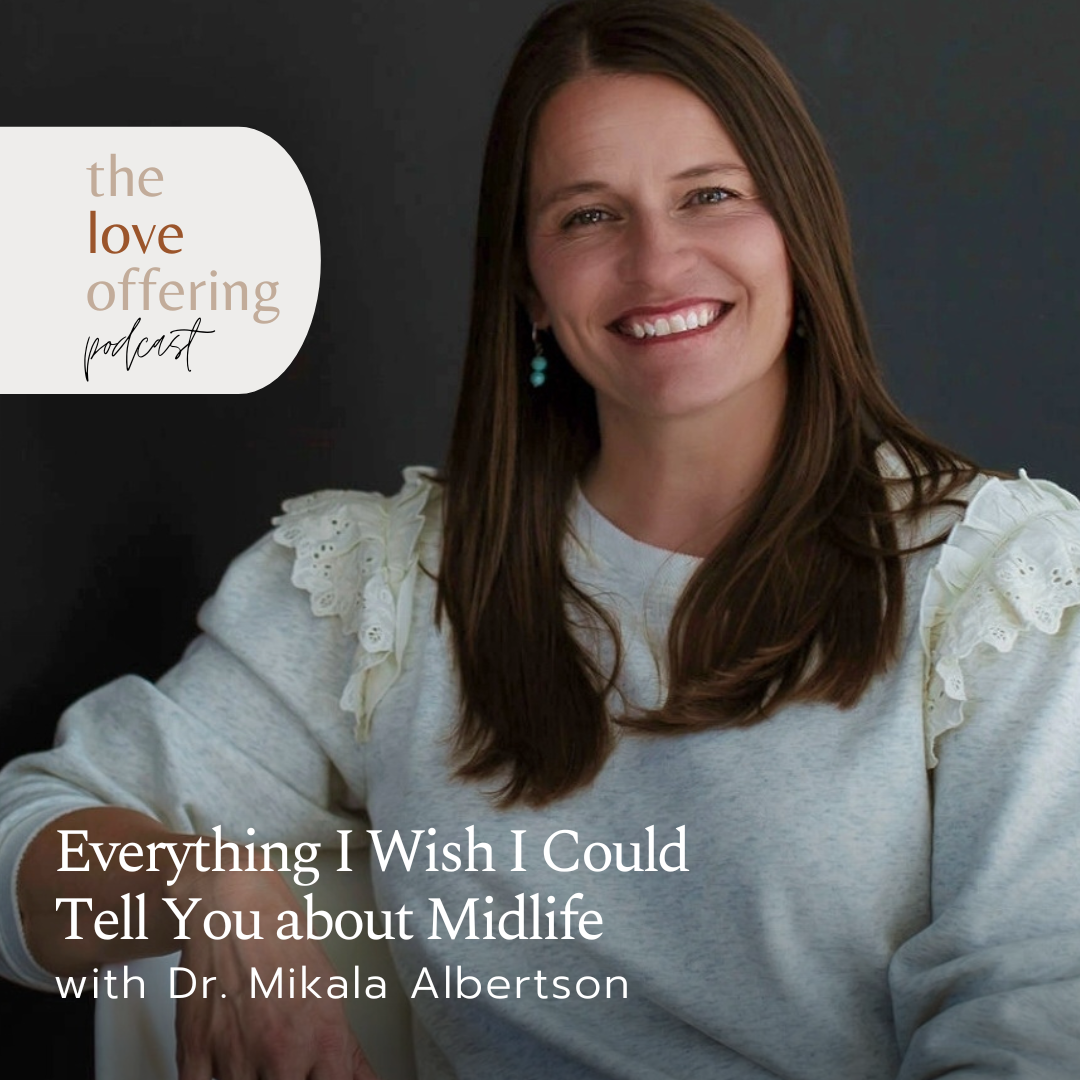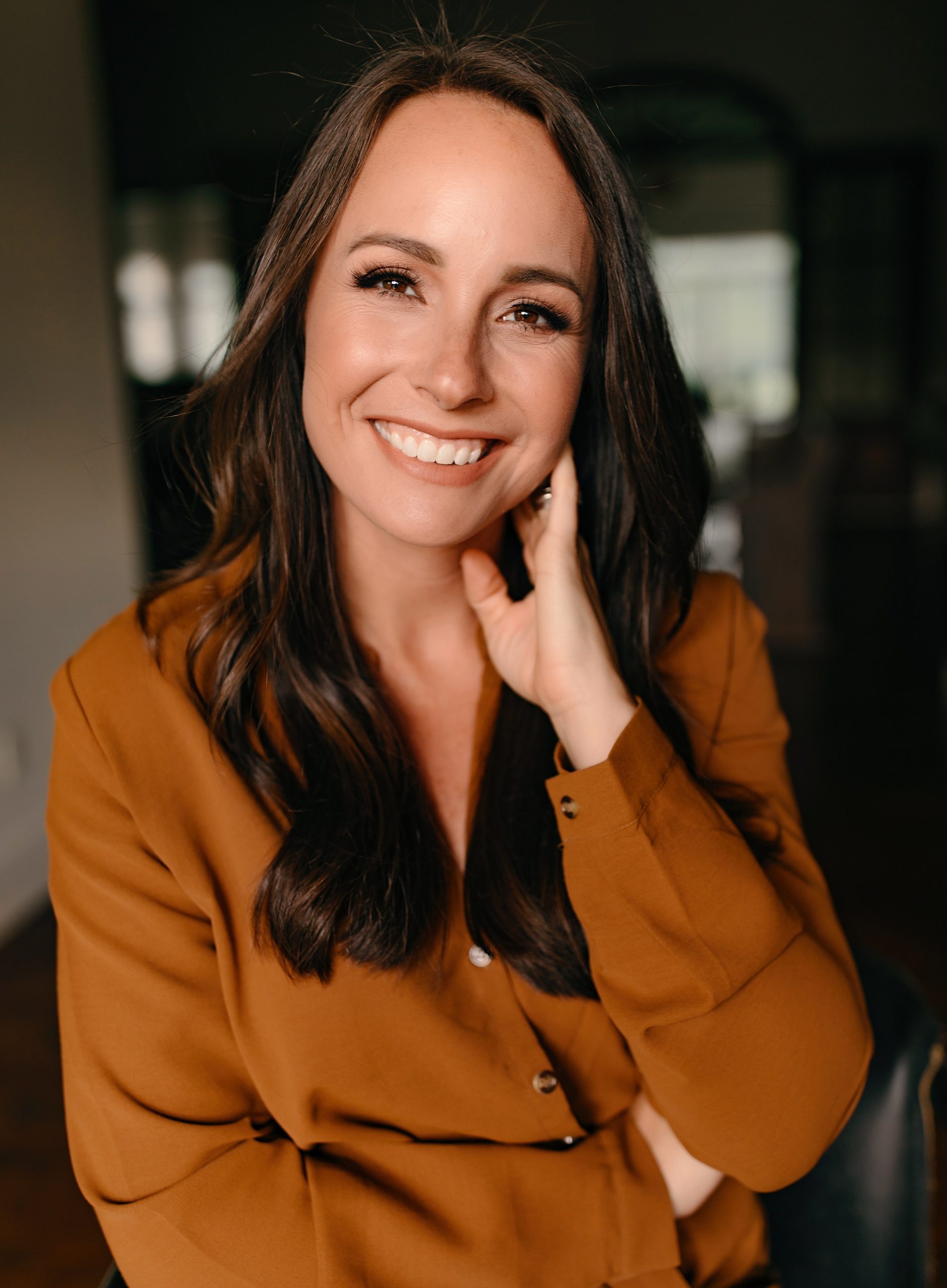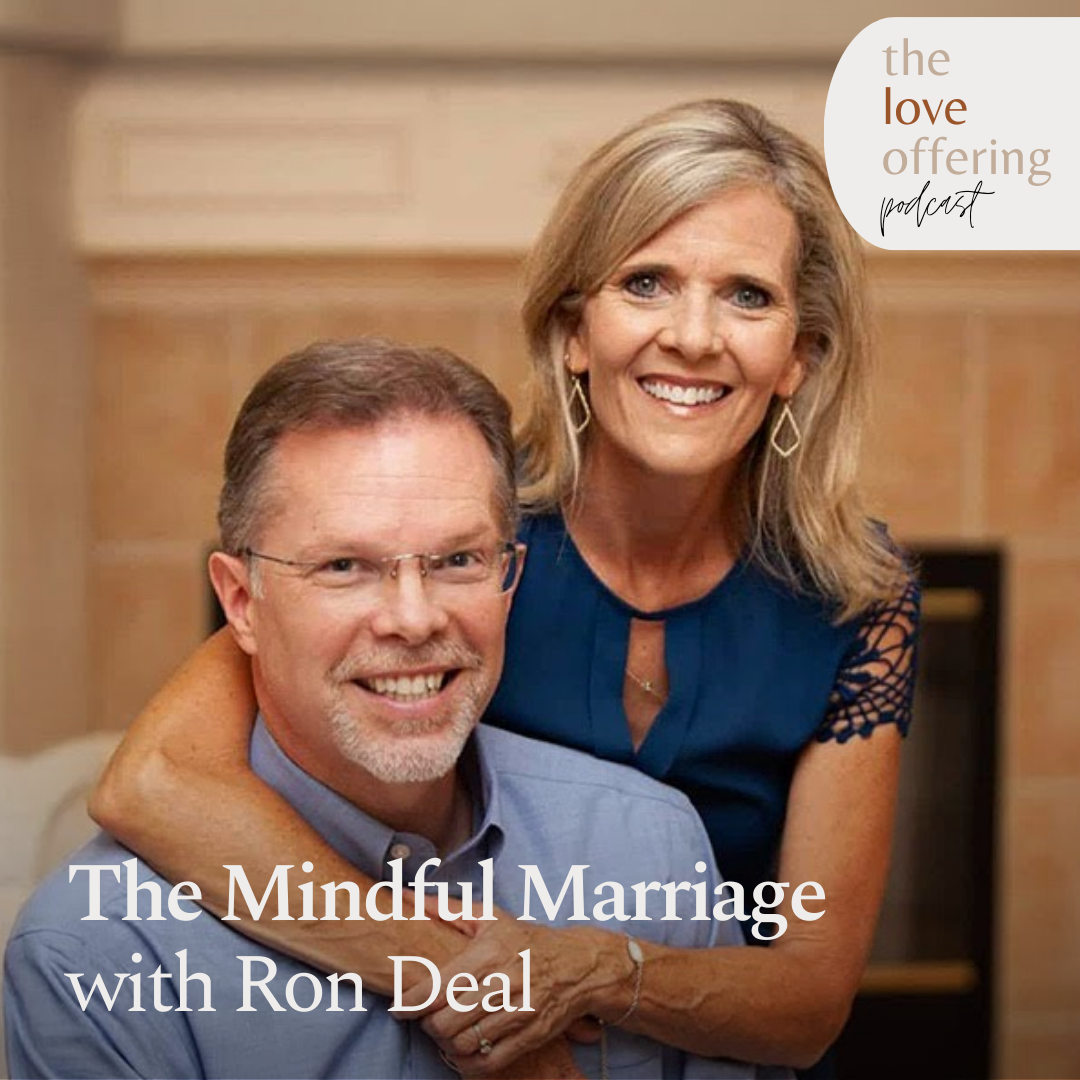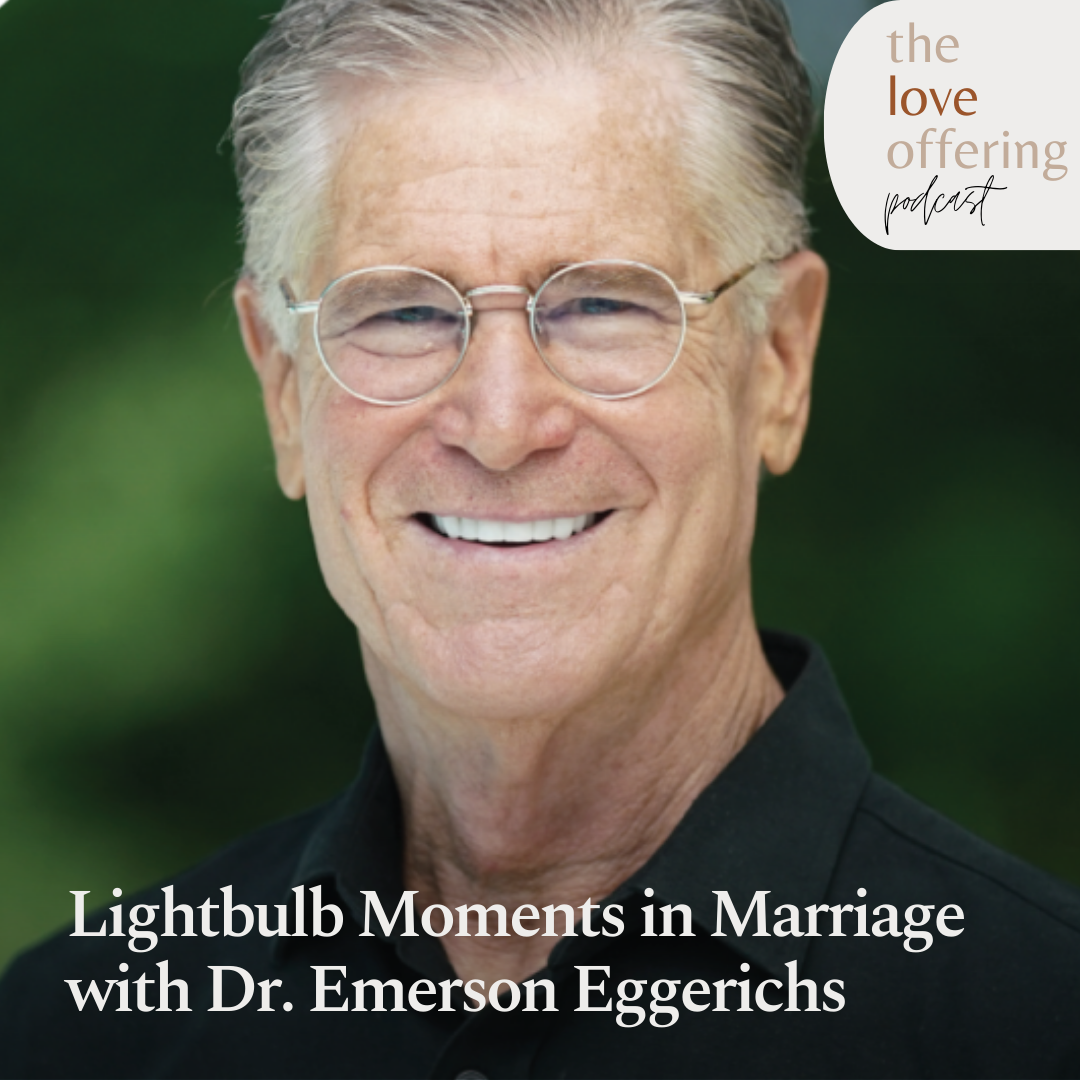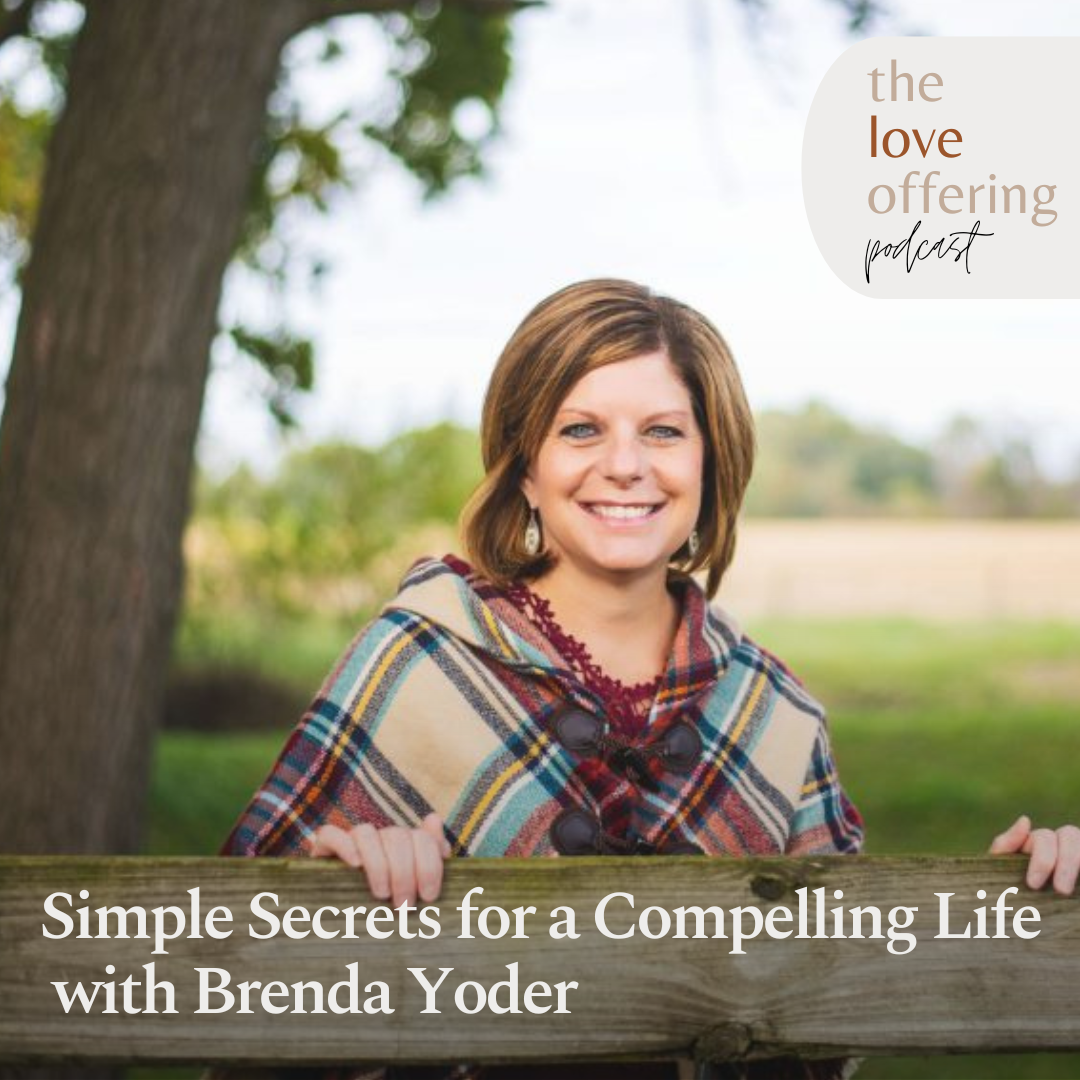Have you ever found yourself wondering, Is this it? I thought life would get easier by now. I thought I’d have more figured out. Maybe you’ve been feeling off, struggling with fatigue, stress, or unexpected changes in your body and wondering—is this midlife, perimenopause, or something else entirely?
This week on The Love Offering Podcast, I had the privilege of sitting down with Dr. Mikala Albertson, a family physician and the author of Everything I Wish I Could Tell You About Midlife: A Woman’s Guide to Health in the Body You Actually Have. In this powerful conversation, Dr. Mikala brings both her medical expertise and personal experience to help us navigate the complexities of midlife with grace and knowledge.
We discuss:
✔️ How to care for and find healing in the body you actually have
✔️ The impact of hormones, stress, and perimenopause on your daily life
✔️ The harmful effects of cultural and societal expectations on women’s health
✔️ How shifting roles in work, relationships, and motherhood impact our well-being
✔️ Practical steps to prioritize preventive health and embrace this season with confidence
Midlife doesn’t have to be a season of frustration, confusion, or feeling like your body is working against you. There is beauty here, too. Dr. Mikala’s wisdom is both reassuring and empowering—reminding us that we’re not alone and that healing is possible.
I invite you to listen in and be encouraged. Click here to tune in to our conversation.
Summary
In this episode of the Love Offering Podcast, Rachael Adams welcomes back Dr. Mikala Albertson to discuss her new book, ‘Everything I Wish I Could Tell You About Midlife.’ The conversation explores the unique challenges women face during midlife, including understanding perimenopause, navigating body image issues, managing emotional and physical changes, and the importance of building support networks. Dr. Albertson shares practical self-care strategies and emphasizes the need for women to embrace their bodies and seek help when needed. The episode concludes with a biblical perspective on worry and love, encouraging listeners to appreciate their current season of life.
Takeaways
Midlife is a time of significant change and self-discovery.
Understanding perimenopause is crucial for women’s health.
Body image issues are prevalent and require compassion and acceptance.
Emotional changes during midlife can be complex and multifaceted.
Building a support network is essential for navigating midlife challenges.
Self-care practices should be prioritized for overall well-being.
Women often underestimate the importance of regular health check-ups.
Cultural pressures can distort perceptions of beauty and health.
It’s important to recognize and address feelings of sadness appropriately.
Finding joy in creative outlets can enhance mental health.
Chapters
00:00 Introduction to Midlife Conversations
03:09 Understanding Midlife and Perimenopause
06:09 Body Image and Self-Acceptance in Midlife
10:12 Emotional and Physical Changes During Midlife
12:49 Managing Life Stressors in Midlife
16:01 Building Support Networks
19:53 Practical Self-Care Strategies
24:07 Biblical Perspectives on Worry and Love
26:59 Creative Outlets and Personal Joys
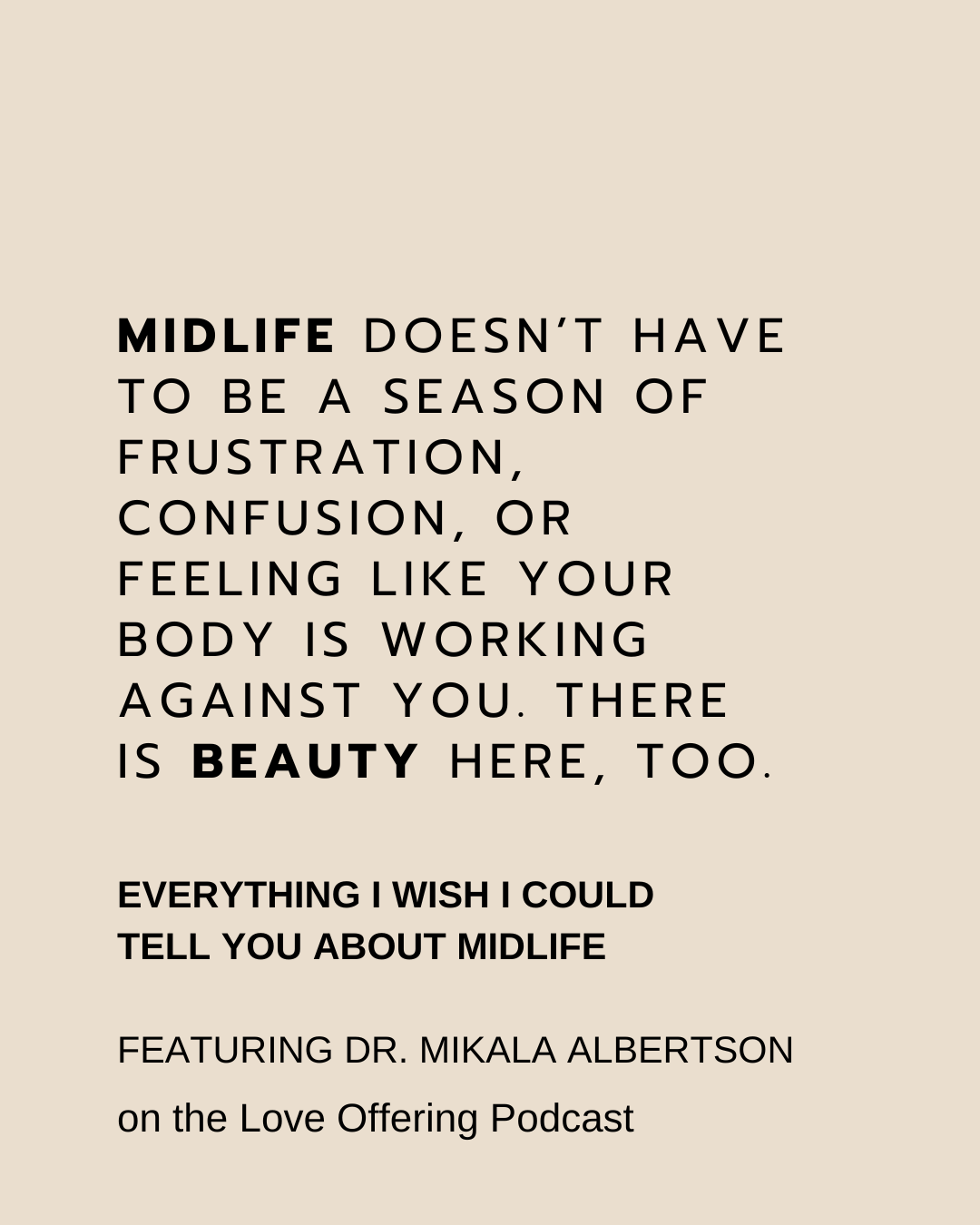
Transcript
Rachael Adams (00:01.016)
Hello, Mikala, and welcome back to the Love Offering Podcast. I’m so happy to have you again.
Mikala Albertson (00:05.764)
Yeah, thanks so much. It’s nice to see you again.
Rachael Adams (00:08.686)
So the last time you were on, we talked about your book, Ordinary On Purpose, which I loved that episode. Everybody needs to go back and tune into that. But today, we’re discussing your new book, Everything I Wish I Could Tell You About Midlife. I am, I mean, I’m 41 as we’re recording. So I feel like, mean, none of us know when our midlife is, but I feel like I’m smack dabbing it. So, I’m so excited about today’s conversation. And so, in your book, you blend science stories and practical tools to support women in this stage of life. And I want to tell everybody you are a doctor before we hit record; I’m like, do you want me to call you Dr. Albertson? And you’re like, no, just Mikala, I love that you have this science background. What inspired you to write this book and share your journey through midlife? That’s kind of, it’s vulnerable.
Mikala Albertson (00:58.564)
Yeah. Yeah, thanks. So yes, I’m a family doctor by training. I was out in clinical practice for 18 years and I have a fellowship in women’s health. So, I’ve always been interested in seeing and treating women. Well over half my patients were women and the really cool thing about being in family practices, I also get to see their families. So I would see them again when I saw their kids, which was always fun because I wasn’t seeing them as a patient, but I got to know families well. And then, about two years ago, not quite two years ago, I quit that clinic job and started writing full-time. And I started writing on this book because it’s near and dear to my heart. I turned 45 this summer and it really does feel like the very middle of my life. I would be so lucky to live to be 90 years old and I’m beginning to deal with so many of the issues, so many of the medical complaints and symptoms, but also kind of the life issues that many of my patients have come to talk to me about over those 18 years when they were in their 40s, early 50s. And so I think that perimenopause and this midlife stage is having a moment right now on social media. We’re hearing a lot about it. We maybe didn’t know what perimenopause was a few years ago, and now I feel like almost everybody has heard about it, maybe more than they’d even like to. And I just thought it was time to put together a book speaking specifically to that, just as a reliable and truthful source of information that women could turn to.
Rachael Adams (02:42.222)
I’m so glad, you know. There are books about what to expect when you’re expecting, and all of them are like, now it’s like, okay, what to expect when you hit midlife? I feel like we needed this book. And so I think many women in midlife ask, is this my thyroid, is this perimenopause, or is this just what midlife feels like? So, how can women begin to understand the unique challenges happening in their bodies and address these questions?
Mikala Albertson (03:09.112)
Yeah, that’s a great question. I think it’s something that we, as women, struggle with. I think it’s something I, as a medical provider, struggle with because we can’t compartmentalize those things. It’s really hard to say, okay, this is just this. This is just your thyroid or this is just stress. This is just hormones related to perimenopause because sometimes all those things are going on at the same time, and they have an effect on one another. And so, With this book, I try to address those things so that we can sort of talk about all of them at the same time and address all of them at the same time, right? I think this mid-life time is a good time to establish a primary care provider, see them for your yearly exam, and have a relationship with them. We are really good at taking our kids in when they’re young for their well-child checks. We’re good at getting our teenagers in for sports physicals.
We were pretty good about being seen when we were pregnant and needing maternal care. And now in our forties, it’s like, well, I don’t know, I’m probably fine. Or I don’t even know when I’m supposed to go to the doctor. But this is the time to establish care to kind of help you through this perimenopause time. Your needs will change over time. And I think if you really have a good provider, then you will know who you can go to and they will know you and you’ll be able to decipher like. This is a new symptom that has come up. Is this something new that’s wrong? Is this just me dealing with stress? That way you don’t have to do it alone.
Rachael Adams (04:45.74)
Yeah, it’s so valuable and you’re so right. We put ourselves on the back burner and let every, you know, it’s like, well, it’s not a big deal. It’s just normal. Well, maybe if it may be, it’s not, maybe that somebody can actually help you to feel better than you’re feeling now. So, you also talk about the pressures of cultural and societal expectations, especially regarding body image. Gosh, this is, this is so prevalent and something I feel myself. So, how can women learn to embrace the body they have while navigating the physical changes that come with midlife? I mean, I am to the point where it’s starting to affect my confidence, if I’m being honest, and you’re comparing yourself to what you used to be, and you’re just not there anymore. But then you see other women, it’s like, gosh, how is this not affecting them? What are they doing that I’m not? What’s the secret? So this is a big one. I’d love to hear your answer.
Mikala Albertson (05:40.068)
Yeah, I have a whole chapter in there on body image and it’s a really vulnerable chapter for me because it’s my personal story. So some of the chapters are about patients and some of them are about friends. This particular chapter is one of my own stories, and I have struggled there, and I’ve struggled there for a long time. Marketing is powerful, and they do a good job of selling what the ideal woman looks like, right, selling what beautiful is. Now, I think it is in midlife. They’re doing an excellent job of selling to us. What health is, and they have sort of confused beauty and health and Sinness and health, and so we think well, to be healthy, we have to be thin, and our bodies have to look a certain way, and Now that they’re thrown in the mix is like anti-aging products. And so, if we want to be healthy in midlife, we must look young.
You shouldn’t have fine lines and a neck that looks slightly different than before or any effects of gravity. So marketing is so, so powerful. And so I’m hoping that pointing that out will make us all think a bit more. We have been fed those images, and we’ve been fed that information our whole lives without knowing it. It’s interesting, my daughter’s eight now. Every once in a while, she’ll say something to me: wow, where did you pick up on that idea? She’s becoming a little bit more body-aware, and she’s only eight, so I need grace and permission to have complex feelings around it because that isn’t your fault. That is something that you’ve just picked up from culture. And so I talk a lot about the idea of body neutrality. I think body positivity has been around for a while. For example, bodies are beautiful, and I love the skin you’re in, which is fantastic but sometimes challenging. And body neutrality is maybe a little bit more gentle. Approach: I’m just saying that this is the vessel I get to live in. And this is the vessel that allows me to be a mom, hug my kids, be with my spouse, and, you know, go out with my girlfriends and take a long walk. And how beautiful is that? So I don’t love the way I look all the time. Sometimes, I get frustrated with the changes that have come along, but I can still love and care for this body that I actually have. So I think it takes a little bit of a mind adjustment. And I think I will be doing that forever, especially for myself. I had a book launch party on Tuesday, and the book came out. My husband was taking pictures and videos and doing other things. I was looking at them at the end of the night, and I’m so sad and a little bit embarrassed to say that my first thought was, you look a little bit. You know, like it’s still there, and it’s ridiculous. I’ve written a whole book about it. There’s a chapter on body image, and I wonder if I will ever not have that first thought when I look at myself. but it didn’t stick around for long, and I just thought, look how happy I look. Look at what a wonderful evening that was. Look at me smiling with my friends. And so it just takes some time, and it takes some work, and it takes some grace, I think, and this level of acceptance, and I think we’ll work on it continuously.
Rachael Adams (09:27.618)
I think you’re right, and I don’t know where I’m getting this information, but it’s like the women in their 80s wish they were the women in their 60s, and the women in their 60s wish they were women in their 40s, and the women in their 40s wish they were women in their 20s. It’s like, we only realize how good we have it right now. And then just to appreciate the season that we’re in, yeah.
Mikala Albertson (09:43.729)
Yeah, isn’t that true? I look back at pictures now, maybe from college or as a young mom, and I remember thinking, I thought I was so fat in that picture, or I looked at it, and I did not like something about it. I didn’t like the way my arm looked, or I didn’t want my neck or something. And I look now at that, and I think I was so beautiful. Look at that lovely moment in that picture. And I don’t I don’t want to continue down that path. So I’m hoping that with some awareness and talking about it and actually working on it and just really living my life like I love my body, I’m hoping that that won’t necessarily be the case.
Rachael Adams (10:27.626)
Me too, but the reality is it does affect our mood. It does affect how we show up. And then we have our hormones, and everything changes, too. Our mood and overall well-being are not just how we look physically but how we feel. We start to feel those effects during this menopause or perimenopause season. So what are some signs women should be aware of, and how can they manage the emotional and maybe the physical effects too, if you have anything to add?
Mikala Albertson (10:56.932)
Yeah, sure. Well, I think there’s kind of two parts to that question. Perimenopause has a lot of physical symptoms that we can be aware of. those are, of course, menstrual changes and hot flashes. Those are kind of the two that we think about a lot as hallmark symptoms. But there are a lot of other insidious changes that may be like, yeah, that has been bothering me. Once you start to have those hallmark symptoms, you can be like, yeah, my sleep has changed. My mood is a little bit different. I’m more irritable. I’ve noticed I’m a little more achy in the morning. My joints hurt, my shoulders, my elbows, my knees, itchy skin, skin changes, like the texture of your hair and dryness in your skin, vaginal changes, dryness. It affects every organ system. And then our mood comes along with that. And so sometimes it’s hard to tell, am I feeling down because this is hormonal stuff and it’s gonna improve maybe with where I’m at in my cycle if you’re still having cycles or with menopausal hormone therapy or is this something more, is this like a diagnosis of depression or anxiety? And so we can, in those perimenopausal times, be a little bit more prone to depression. And so I like to tell women that it’s okay to feel sad appropriately for sad experiences. We want to feel the full range of emotions, but it’s when that down feeling or sadness settles in and lasts for a while. So, two weeks is the kind of marker that we use. Although most of the time when I see women about this, it’s been much longer than that. But that sadness or that depressed mood has come settled in, and it’s starting to affect concentration and sleep and how you can perform your daily activities. And then eventually you stop enjoying the activities that you used to enjoy and that sadness sort of takes over. And that’s when you need to seek more help and maybe use something more specifically for mood like a serotonin rep, take inhibitor.
Rachael Adams (13:17.336)
Midlife often brings significant life stressors, including changes in our relationships, caregiving roles, and shifting work or motherhood expectations. What advice do you have for women managing these co-occurring stressors while also caring for their health? There are so many roles we all play as women. It’s hard to balance it all.
Mikala Albertson (13:42.384)
Yeah, and the roles shift a lot during this time. I’m going through that myself. I’m in a marriage that’s over 20 years old. My career has taken a huge transition in these last couple of years. And now I’m parenting 19, 17, and 14 kids. And so I no longer have really little kids. I still have an eight-year-old. So I’m, you know, still doing little kid stuff, but I’m doing huge kid stuff, and I wish I had a great answer for how we manage that. But I do have a chapter in there about stress and how we sort of complete the stress cycle and how we can move through stress in our lives. Stress is actually good. It is a protective mechanism in our bodies. We are supposed to feel appropriately stressed sometimes so that we can do appropriate action, like if we need to run away, right? But it gets confusing when it’s chronic stress, it’s daily stressors that come up, how do we process that? And so I do have some helpful tips in there. And I thought I would share, actually; I have a wonderful friend who’s about five years older than me. And so she’s just a little bit further along, like the midlife journey and the parenting of older children. And one thing she told me, which I have thought of probably 100 times since we just talked about it in the last month or two, that she is like, you know, I have to remind myself that what’s happening with my kids or my spouse or whatever isn’t happening to me. Like, I have already graduated from college. I have a job and I’m financially secure. And so it’s hard to watch our kids do it. Still, sometimes, and especially as an empathetic person, I almost can’t separate my emotions from my children’s, and I will feel something as if it is happening to me. And so that reminder like, you are safe, you have already done college, you graduated, you did it, you’re married and to point out like, I’m not living my children’s lives. So, I’m a much better support person when I’m not experiencing all their emotions, and I have much better contentment and well-being when I can make that separation. I’m not experiencing all my children’s emotions. So I hope that helps someone. It has helped me immensely. I thought that was just brilliant wisdom to share and kept thinking about it. It’s so hard for them. How do I support them? And it’s not me experiencing it. So, hopefully, we can learn to do that and healthily process our stress.
Rachael Adams (16:28.078)
I think that is really helpful. You mentioned that we are the support system for so many people, but I think it’s really essential. As you just mentioned, your friend is a support system for you. Just to see another woman, whether it’s a doctor or a friend who is a little further along, it’s so valuable to have a support system during midlife. So, how can women build and maintain strong support networks as they navigate the changes and challenges of the season?
Mikala Albertson (16:53.486)
Yeah, that is so important. I used to think that I needed like 10 or 20 wonderful, great, best friends, right? I would say sometimes maybe in high school or college, I don’t have a lot of friends. But I don’t think we need a lot of friends. We need like maybe one, two, three, like really, really close, good friends like this woman that I was just talking about. But our circle, our circle of support is actually much bigger than that. So I talk a little bit about in the book about how God builds us a team. And I didn’t realize my team until, I would say, in my 40s when I looked at it. Many people who care about me all the time who care about me or my children or family. And that team is big.
He was my instructor along the way. It’s my children’s teachers now who I talk with. I see this gal at the grocery store every three days because I’m always there with my teenagers. But I almost always see this same gal and she loves earrings and she’s always wearing different interesting like seasonal earrings. And so I stop and notice her earrings, and she asks how I am, and I ask how she is. And I would say she is just this familiar friendly voice and friendly face that I see multiple times throughout the week. So if you actually sat down and listed your people, which I ask people to do in the book, and you might start with your intimate circle, but then all of the people that affect you and your life, where you’re living right now, your neighbors, your kids’ coaches, or the moms on the soccer sidelines that you are genuinely happy to see every Saturday when you get there, your circle is actually big, and those are your team. Those are people that you call when your kids need a ride or whatever you might need and they do and will show up for you. So my idea of what is our support system has changed a little bit over time as I’ve sort of broadened my perspective on that. I do have those few really close friends, and it takes some work, I think, to maintain that and share your life with them, to invite them to share with you, to be a good listener, and to prioritize some time together. It does take some work, but it also doesn’t take much. So my close circle, I don’t see them very often at all, but we talk almost every day. We text back and forth. We know what’s going on in our lives. Have you found that, Rachel? You can like, you know, your circles of friends when you think about the rings of people that make up your team, right?
Rachael Adams (19:42.338)
Yeah. Absolutely. Mean, I think many times it is a lot of my kids, you know, when you’re when you’re in our stage of life, it’s like we go wherever our kids are. So it is the moms and the bleachers and the moms on the PTO and the people in the pew beside you and your Sunday school classes or Bible study or at work and even online. Because of this podcast, I feel like I have developed so many great friendships and learned from so many people. So, I think it can happen in many ways, including family. So it’s so invaluable. And I’m just so thankful that God knows that we need community and will supply us with community and is there for us in every amount of stress. And when we feel like we lack discipline, he’s created our bodies, and our bodies are good. And so just to be able to steward those well, I think, is such a challenge, but he is there with us every step of the way. And so I would like to just maybe follow up that thought with what are some practical ways because as we’re you know you and I are in our 40s and prayerfully we’ll continue to get to live many years more but for no matter what season we’re in we can always be taking care of ourselves now for our future selves. So what are some specific ways that we can kind of be intentional now?
Mikala Albertson (21:06.084)
Yeah, sure. I don’t know that I have any groundbreaking things to share here. It’s like all the things that we already know kind of we’re supposed to do. I’ve been talking about it in a way; how you would feed and treat your children and try to care for your family is really how you should work on caring for yourself, right? I think it becomes even more critical during this time to be. Feeding yourself nutritious food. I know that sounds very broad. There is a lot of information out there on the right way, and it can be overwhelming, and then we wanna throw it out the window, right? But I try to say gently, could you just add a fruit or vegetable at every meal? Is that sustainable?
It is pretty simple, and at least you’re thinking about what you’re having. I think exercise is even more critical now than it has ever been. And I’ve been telling the women who listen and follow all my writings that weight training, resistance training is more important now than ever before. So we’re losing our muscle mass during this time and we need to try to maintain what we’ve got. Resistance or weight training is super important for bone health and our mobility and movement in the future, so that one’s huge. And then rest. And I think we hear about rest a lot. And also that can be super frustrating because you’re like, I’m trying to rest.
I’m trying to sleep and I don’t sleep. So there’s a chapter on sleep in here. And I like to say, Hey, let’s just shoot for seven to eight hours and let’s set ourselves up for that amount of time. Even if you’re not sleeping that long, I know I’m guilty of this. I don’t get to bed to even give myself enough time to be sleeping seven to eight hours. When I get to bed, do I have the environment set up so I can rest or sleep? Or are there screens, distractions, people in your bed, pets in your bed, or ways that we could maybe make it a little bit easier? So all of those things that we know that we should be doing are so important right now. And we can do the best we can there. So I know that it can be challenging, frustrating, overwhelming, and it’s like, I’m not good at that, so I’m not doing any of it. But in that book, I talk about kind of the small yeses, the micro yeses that we can make toward better health. And a little bit goes a long way, as you know, right? So we can start with that.
Rachael Adams (23:35.383)
Perfect. I know you’re right. We all know what to do. It’s just actually doing it, and I think what you’ve talked about is a perspective shift to find Beauty in the season that we’re in and beauty with how God created us and Loving ourselves the way that he did make us in this season that we’re in so that Maybe segues into my next question for you that I’ve been asking all of my guests. Is there a biblical concept of love that you think applies to this topic today?
Mikala Albertson (24:12.92)
Yeah, gosh, that’s a good one. There are so many things we could choose from. think this verse that I keep coming back to, or this chapter in Matthew that I keep coming back to, I think it’s chapter six, about worry. And sometimes I think the opposite of really understanding God’s love for us is to be worried about everything all the time. And that particular part comes back to just those simple things. Why are you concerned about what you’re going to eat or what you’re going to wear? And then we could take that further what we’re going to do or how we’re doing life and talks about the lilies and how and the birds in the air and how they are cared for and loved and aren’t we so much more loved and valuable than they. I’ve been back to those particular parts of the Bible so many times, especially lately, because I’ve been very worried. But it’s this reminder to be where you are today, to take care of today. Tomorrow has its worries. Just be where you are today. What can you do today to care for yourself, to care for your family, to care for your loved ones and know that God cares for you infinitely more than that, more than we could ever even imagine. And so we don’t have to worry. We are just loved.
Rachael Adams (25:38.927)
That’s so good. I really love that answer. So is there something that you are loving right now? No rules to this one. Just a product, a person, a place, a food, thing, exercise, whatever. Sleep.
Mikala Albertson (25:50.832)
Sure. Here’s what I’m loving right now. My favorite kind of procrastination thing, but also just my favorite creative thing is we are finally getting to have a little cabin in the woods. And so we will get that cabin in hopefully June of this next year. And I have been collecting furniture off of marketplace, mostly free things, but lots of antique pieces. I love antiques and I’ve been finding things that I think are beautiful and then refinishing them. So I’ll sand them down and restain and it’s like hard work. I get sore from sanding and doing this and I just get messy and dirty and it takes all this time to do it. And then the pieces come out just beautiful and I’ve been enjoying that so much. So I just did that yesterday. I got this little cupboard that is old and falling apart and I actually had to nail it back together and kind of start the process of sanding. And that is bringing me so much joy.
Rachael Adams (26:59.344)
I’m excited for you. It’ll be such a great place to make memories as a family and with friends. Good for you for being brave enough to put in the work to do it. I’m impressed.
Mikala Albertson (27:09.712)
Yeah, my husband’s like, can you please stop buying furniture because our garage is full? And I’m like, honey, I have barely spent. These are free things. I just take them and fix them up. You should be happy that I’m outfitting this place for like $300, you know? So it’s fun.
Rachael Adams (27:23.714)
There you go. That’s impressive. Yeah, you should maybe you’ve found a new business.
Mikala Albertson (27:30.67)
Maybe, yeah. I just fall in love with each piece and think, gosh, how would you ever get, you know, I love them so much, but it is. It’s a fun time. It’s very creative, and I love it.
Rachael Adams (27:42.272)
Yeah, well, good. Good. Well, I know I want to stay connected with you, and I’m sure listeners will want to, so tell us how we can best do that.
Mikala Albertson (27:50.432)
sure. So I’m on Instagram and Facebook as Michaela Albertson MD. I also have a little Instagram page called Be Well-ish and it focuses in really just on medical topics. So there’s a lot less personal stuff shared there, not as much writing, but really just women’s health topics and current medical guidelines. I’d love to have you follow me there. And then I have a website, MichaelaAlbertsonMD.com. There are lots of free resources for you and lots more writing and things to read. So, and then the book is available anywhere books are sold. So Amazon, Barnes and Noble, Target, wherever you want to order your books.
Rachael Adams (28:30.998)
I will include all of those links in the show notes and again everybody her book is called everything I wish I could tell you about midlife I feel like we could have this conversation for all day and into the next day. It’s so deep. So thank you for being vulnerable. It’s been helpful to me and I know we all need to get your book. I’m sure that there is so much more information in there. But as we close would you do us the honor of praying for us?
God, we thank you for today. We thank you for this time that we’ve had together. We ask that you’ll continue to walk this midlife journey with us as we are navigating transitions in our lives and in our relationships, in our careers, in our motherhood. We ask that you’d be with us as we care for these beautiful bodies that you’ve given us and help us to learn to love them the way that you do and to care for them the way that you do to find some acceptance and grow in health in these bodies that we actually have. We are so grateful for your presence in our lives, God. Amen.
Rachael Adams (29:45.086)
Amen. Well, Makayla, thank you so much for being my guest and encouraging us in our midlife and beyond.
Mikala Albertson (29:51.288)
Yes, thanks so much. It was fun to chat with you. Thanks, Rachael.
*Transcript is AI Generated.
Connect with Mikala:

